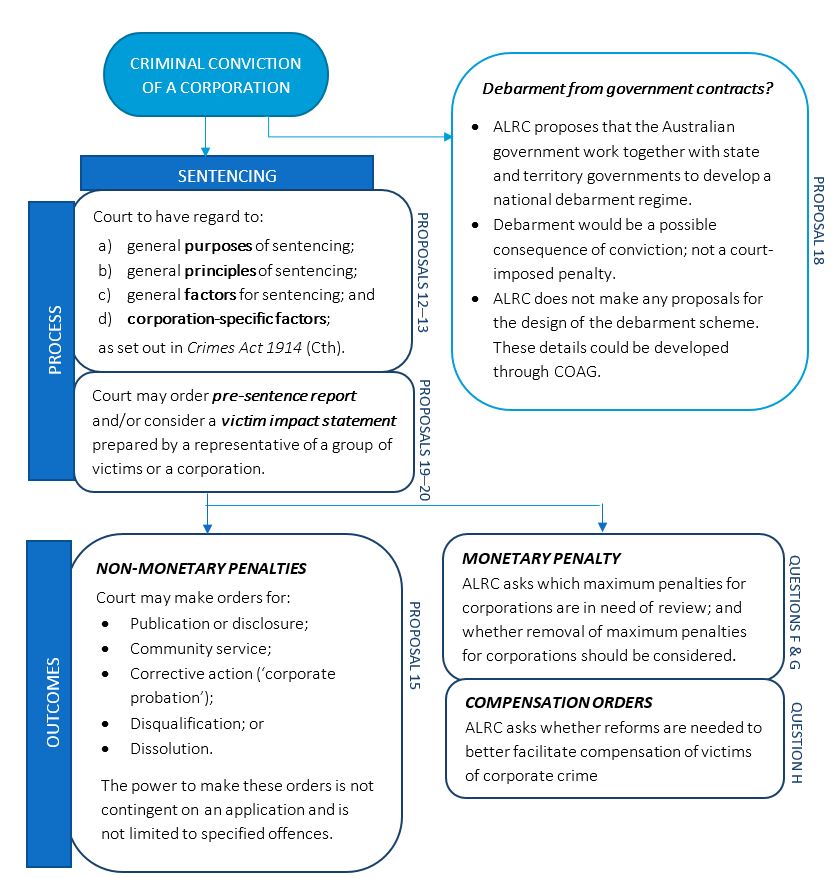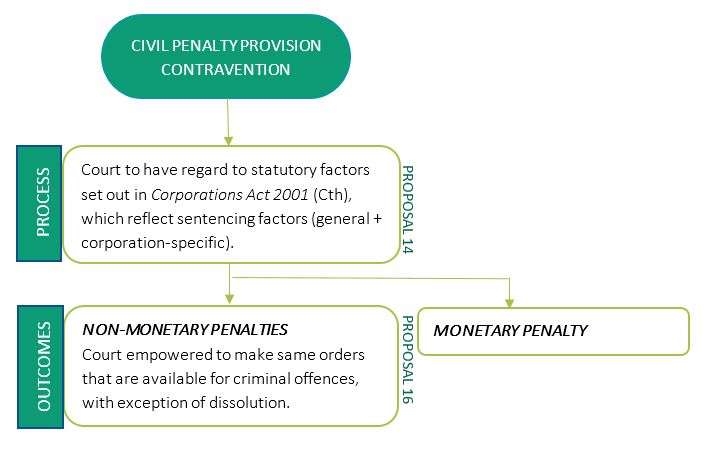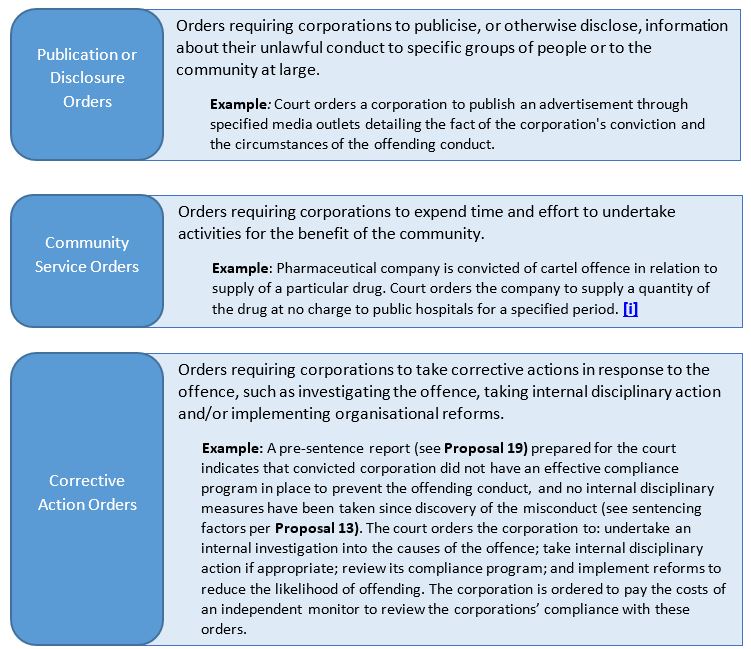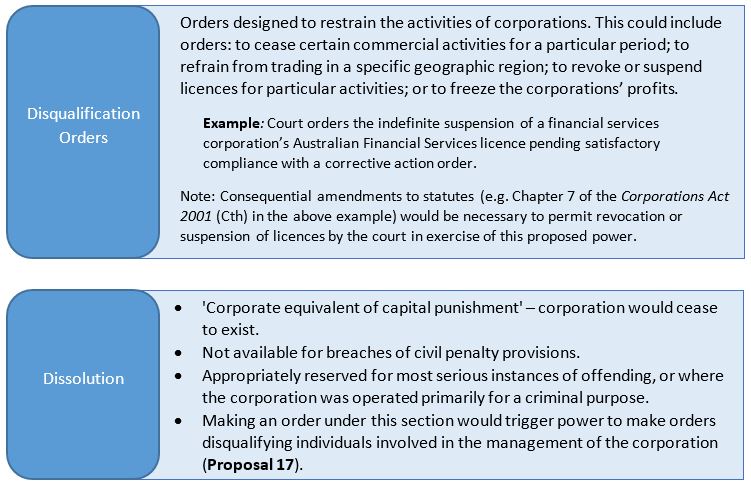18.12.2019
When sentencing an offender key objectives include:
- denouncing the conduct of the offender;
- ensuring that the offender is punished justly for the offence;
- deterring the offender and others from committing the same or similar offences;
- promoting the rehabilitation of the offender;
- protecting the community by limiting the capacity of the offender to re-offend; and
- promoting the restoration of relations between the community, the offender and the victim.
Each of these objectives may be relevant to sentencing corporate offenders. However, the ALRC has found that there are limitations on the ability of courts to pursue relevant objectives when sentencing corporations. This blunts the force of the criminal law as a regulatory tool for addressing corporate wrongdoing.
In Chapter 10 of its recent Discussion Paper on Australia’s corporate criminal responsibility regime, the ALRC makes proposals to improve the process and outcomes of sentencing corporations. The ALRC proposes to enhance the court’s sentencing toolkit by:
- providing for a range of non-monetary penalty options for corporations; and
- strengthening the information base available to courts when sentencing corporations.
The ALRC suggests that court-imposed penalties should be supplemented by a national debarment regime, which would limit the involvement of criminally convicted corporations in contracting for government work.
Proposals also aim to promote consistency between the processes of sentencing and imposing civil penalties on corporations.
Finally, the ALRC invites stakeholder views on the desirability of reforms to maximum penalties for corporations and improving the availability of compensation for victims of corporate wrongdoing.
Figure 1 provides an overview of the effect of the ALRC’s proposals and questions on sentencing. The proposals relating to non-monetary penalties and statutory guidance on sentencing corporations are discussed in more detail below.
Figure 1: Overview of proposals and questions from Chapter 10 of Discussion Paper (Sentencing Corporations)


Expanding the court’s sentencing toolkit for corporate offenders
The ALRC proposes to equip the court with a general power under the Crimes Act 1914 (Cth) to make a range of non-monetary penalty orders when sentencing corporations that have committed a Commonwealth offence (Proposal 15).
The desirability of a general power to make non-monetary penalty orders stems from the well-known limitations of monetary penalties for corporations. Setting monetary penalties at a level that deters corporations is a fraught exercise, and the costs of monetary penalties are liable to be passed on to parties who were not involved in the wrongdoing (consumers, employees, shareholders). Furthermore monetary penalties are poorly adapted to promoting the sentencing purposes of rehabilitation and restoration, and may be viewed as insufficiently denunciatory.
Empowering courts to impose non-monetary penalties in addition to or, in appropriate instances, instead of monetary penalties would strengthen the court’s ability to impose a sentence that best promotes the aims of sentencing in respect of the corporation and offending in question. A centralised source of power to make these orders promotes consistency and avoids unnecessary duplication across statutes.
Figure 2: Overview of proposed non-monetary penalty options (Proposal 15)


Each of these orders could be imposed by the court for any relevant sentencing purpose. This differs from existing provisions, which confine the imposition of non-monetary penalty orders to ‘non-punitive’ purposes.[ii]
Where court supervision of these orders would be inappropriate, an independent monitor might be appointed to supervise compliance with the orders, and report to the court as required.
The ALRC also proposes the introduction of an equivalent power to make non-monetary penalty orders for corporations in respect of civil penalty provision contraventions (Proposal 16). The proposed provision would be located in the Corporations Act 2001 (Cth). The power to make orders dissolving a corporation would be excluded from this provision.
These proposals are not novel. The ALRC has made similar recommendations in previous reports.[iii] As has the New South Wales Law Reform Commission.[iv] There is also precedent for the availability of these types of orders in overseas jurisdictions (namely, the US, UK, and Canada).
Statutory guidance on sentencing corporations
The ALRC proposes further amendments to the Crimes Act 1914 (Cth) and the Corporations Act 2001 (Cth) to facilitate the provision of consistent and appropriately adapted statutory guidance on sentencing and imposing civil penalties on corporations.
Existing statutory guidance on the factors relevant to sentencing Commonwealth offenders (Crimes Act 1914 (Cth) s 16A(2)) is primarily targeted to sentencing natural persons. While a number of the existing statutory factors may be relevant to sentencing corporations, others will not apply and, more critically, s 16A(2) does not provide for a number of factors that are highly relevant to sentencing corporations. The courts have instead drawn on the case law relating to imposing civil penalties on corporations to fill the gaps in the existing statutory guidance.
The ALRC proposes the introduction of a non-exhaustive list of statutory factors for courts to consider when sentencing corporations for a Commonwealth offence (Proposal 13, see below). Consideration of these factors would be mandatory to the extent that they are relevant and known to the court.

In addition to the introduction of specific guidance for sentencing corporate offenders, the ALRC reiterates previous recommendations for wholesale reform of s 16A(2).[v] Implementation of these recommendations would involve restructuring the statutory guidance on sentencing Commonwealth offenders to:
- introduce separate provisions setting out the purposes and principles of sentencing;
- provide a non-exhaustive list of eight broad categories of factors relevant to the purposes and principles of sentencing, with examples of the types of factors under each category; and
- separately require the court to consider factors pertaining to the administration of the federal criminal justice system (such as guilty pleas and cooperation with authorities).
The ALRC also proposes the introduction of guidance for the imposition of civil penalties on corporations (Proposal 14). As there is currently no general statutory guidance on the imposition of civil penalties, introducing a list of factors relevant to imposing civil penalties on corporations that merely mirrors Proposal 13 is not possible. The ALRC’s proposed list of factors for the imposition of civil penalties on corporations therefore incorporates the corporations-specific factors identified in Proposal 13, in addition to the types of general factors that are currently furnished by s 16A(2) in the criminal context.
In the absence of an effective legislative scheme for civil penalties, it is beyond the scope of the ALRC’s current inquiry to recommend a statutory provision that would govern both individuals and corporations. Nonetheless, the ALRC has previously recommended the introduction of such a legislative scheme, which would have incorporated a provision governing the civil penalty setting process for individuals and corporations.[vi] The ALRC reaffirms its view that this would be a sensible approach.
[i] Carol Beaton-Wells and Brent Fisse, Australian Cartel Regulation: Law, Policy and Practice in an International Context (Cambridge University Press, 2011) 458–9.
[ii] Competition and Consumer Act 2010 (Cth) s 86C; Australian Consumer Law s 246; and Australian Securities and Investments Commission Act 2001 (Cth) s 12GLA.
[iii] Australian Law Reform Commission, Same Crime, Same Time: Sentencing of Federal Offenders (Report No 103, 2006) rec 30-1; Australian Law Reform Commission, Principled Regulation: Federal Civil & Administrative Penalties in Australia (Report No 95, 2002) recs 27–1, 28–3. See also Australian Law Reform Commission, Compliance with the Trade Practices Act 1974 (Report No 68, 1994) [10.9].
[iv] New South Wales Law Reform Commission, Sentencing Corporate Offenders (Report 102, 2003) rec 4.
[v] Recommendations 4–1, 5–1, 6–1, and 6–8 from Australian Law Reform Commission, Same Crime, Same Time: Sentencing of Federal Offenders (Report No 103, April 2006).
[vi] Australian Law Reform Commission, Principled Regulation: Federal Civil & Administrative Penalties in Australia (Report No 95, 2002) rec 29-1.
